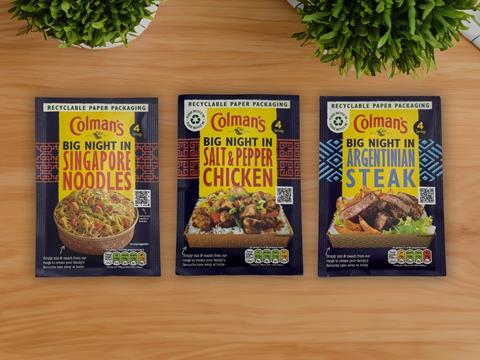
In a new partnership with Be My Eyes, Unilever is expanding its use of Zappar’s Accessible QR (AQR) technology to provide AI-powered virtual assistance for blind and visually impaired consumers via a free app.
The move expands on Unilever’s existing work with Zappar to integrate AQR codes into its Persil and Colman’s products in the UK. A dot-dash pattern is applied around one corner of the AQR code, which makes them detectable through accessibility apps from 1.1 metres away – over seven times the distance available through conventional QR scanning.
These codes will now be applied to Colman’s Singapore Noodles Meal Maker packaging, with more brands set to follow throughout this year. Consumers can scan the code on the front of the pack with a smartphone, which will direct them to the free Be My Eyes app.
There they will be connected to a volunteer on hand to read and describe cooking instructions; or to a virtual AI-chat bot, which uses Chat GPT-4 capabilities to answer questions surrounding the recipe or cooking process. Be My Eyes is said to be the only completely free app that enables consumers with blindness, low vision, or deaf-blindness to receive live accessible information from volunteers, trained customer support representatives, and AI.
This marks the first time Be My Eyes AI technology and its AI-assisted cooking experience has been applied to a food product. As such, Unilever is working with Be My Eyes to train their volunteers and provide Colman’s-specific product information and data to the AI bot.
Its customer support team will also be available to consumers in need of further support, with the AQR providing the option to automatically connect to the Colman’s careline team.
The partnership reportedly contributes to Unilever’s global connected pack strategy, in which new technology and digital experiences are set to improve and differentiate consumer interactions with and use of Unilever products. It will work with Be My Eyes and Zappar to collect feedback from consumers and optimize the technology over time.
Unilever expresses its plans to partner with other accessibility experts and apps in the future to keep expanding and improving the accessibility of its packaging across products, categories, and countries.
Rachana Dongre, senior Digital Engagement and Strategy lead Nutrition & Ice Cream, Unilever, explained: “We’ve accelerated digitizing our packs to offer new opportunities for brand engagement and elevated shopping experience and now we’re also focusing on how we can also use digital experiences to make our products more accessible.
“Zappar’s AQR codes means we can support blind and low vision shoppers to have equal access to information and integrating Be My Eyes into these codes offers a totally new way to make the full experience of our products more inclusive, from the shopping aisle right through to cooking at home.”
“The 285 million blind and low vision consumers in the world buy the same products as everyone else,” said Mike Buckley, CEO of Be My Eyes. “The difficulty in reading package ingredients and cooking instructions has long marred the cooking experience of these consumers. Unilever’s commitment to use new Zappar technology with Be My Eyes is pioneering a new era in product accessibility and disability convenience.”
“Our integration with Be My Eyes is a really significant step towards making access to information a basic human right,” added Zappar co-founder and CEO Caspar Thykier. “By combining Zapvision’s computer vision technology with Be My Eyes’ new OpenAI, ChatGPT4 Vision integration, we’re excited to underpin a more conversational and assistive experience for Be My Eyes users with unambiguous, structured and accurate data.
“This is the start of a new type of ‘product as a service’, levelling the playing field still further for food brands such as Unilever’s Colman’s products. We’re so excited for our continued partnership with Unilever and now Be My Eyes, providing further access to information for the blind.”
On World Braille Day 2024, Roland DG emphasized how detrimental inaccessible on-pack product information is to visually impaired consumers, with a study revealing that 74% of 500 UK adults with visual impairment have picked up the wrong product whilst shopping due to inadequate packaging guidance.
Progress was made in this space towards the end of 2023, with Quorn integrating NaviLens technology into its entire product range and Bayer Consumer Health UK working with Zappar to implement QR into its Canescool Soothing Gel Cream product packaging.
If you liked this article, you might also enjoy:
The Lidl approach to packaging sustainability
How did Brazil achieve its 100% aluminium can recycling rate – and can it be replicated in the EU?
Experts have their say on the EU’s Packaging and Packaging Waste Directive revisions
A deep dive into the most important packaging sustainability trends and solutions















No comments yet